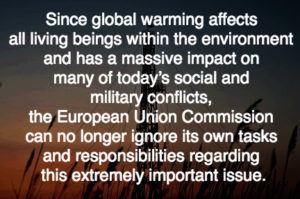By Andy Gheorghiu and Frida Kieninger
 DG Environment from the EU-Commission seems to have its hands bound and is largely unable to protect Europeans from health hazards caused by fracking. There are a few initiatives such as the Human Biomonitoring Initiative (HBM4EU) or the EU platform for chemical monitoring data (IPChem), but these are far from leading to binding legislation aimed specifically at unconventional gas production.
DG Environment from the EU-Commission seems to have its hands bound and is largely unable to protect Europeans from health hazards caused by fracking. There are a few initiatives such as the Human Biomonitoring Initiative (HBM4EU) or the EU platform for chemical monitoring data (IPChem), but these are far from leading to binding legislation aimed specifically at unconventional gas production.
However, the Commission just recently published a review concerning the effectiveness of its non-binding “Recommendation on shale gas and fracking,” which was adopted on January 22, 2014.
Initially, it was “intended to complement EU existing legislation, covering issues such as planning, underground risk assessment, well integrity, baseline reporting and operational monitoring, capture of methane emissions, and disclosure of chemicals used in each well.”
In October, 2015 Food & Water Europe and Friends of the Earth Europe published the report “Fracking Business (as usual)”. The report shows that the European Commission recommendations will not force member states to make even minimal changes to their shale gas regulations. They also rely too heavily on self-monitoring by the oil and gas industry to control the worst impacts of fracking.
Inconsistencies in the EU-COM’s “effectiveness report”
At the end of 2016, the EU Commission finally published a report reviewing the effectiveness of the recommendation on the core principles for shale gas. It acknowledges, that “more progress is necessary, both in the application of the Recommendation in the relevant Member States and in the correct and uniform application of the EU environmental legislation.”
Basically, the “effectiveness report” cannot hide the fact that the recommendation totally failed to generate a harmonized, EU-wide legal framework that puts public health, the environment, climate targets and a much needed energy transition first.
Moreover, it also misses several important statements. For example, it forgets to highlight the fact that Germany continues to grant and extend licenses that may lead to the use of high-volume hydraulic fracturing—without carrying out a Strategic Environmental Assessment.
And although the recommendation refers to the EU-Regulation which urges member states to reduce their greenhouse gas emissions up to 2020, the “effectiveness report” is absolutely silent about existing scientific evidence that shows that the growth of global methane emissions is inevitably connected with fossil fuel exploration (in particular so-called “unconventional fossil fuels”).
Since global warming affects all living beings within the environment and has a massive impact on many of today’s social and military conflicts, the EU COM can no longer ignore its own tasks and responsibilities regarding this extremely important issue.
That’s also the reason why we cannot accept that in the effectiveness report DG Environment also forgets to highlight that in 2015, the EU-Parliament adopted a resolution urging member states, “taking into account the risks and the negative climate, environmental and biodiversity impacts involved in hydraulic fracturing – not to authorise any new hydraulic fracturing operations in the EU”.
The Parliament explains that it has opted for the vote in favour of an EU-wide fracking moratorium on the basis of the precautionary principle and the principle that preventive action should be taken.
We can only support the Parliament with regard to this very clear stand. The only way to guarantee the ‘highest climate, environmental and public health standards’ and to implement the obligations of the Paris Climate Agreement is by not authorising any new hydraulic fracturing operations in the EU.
It’s as simple, as logical and as urgently necessary as that.


